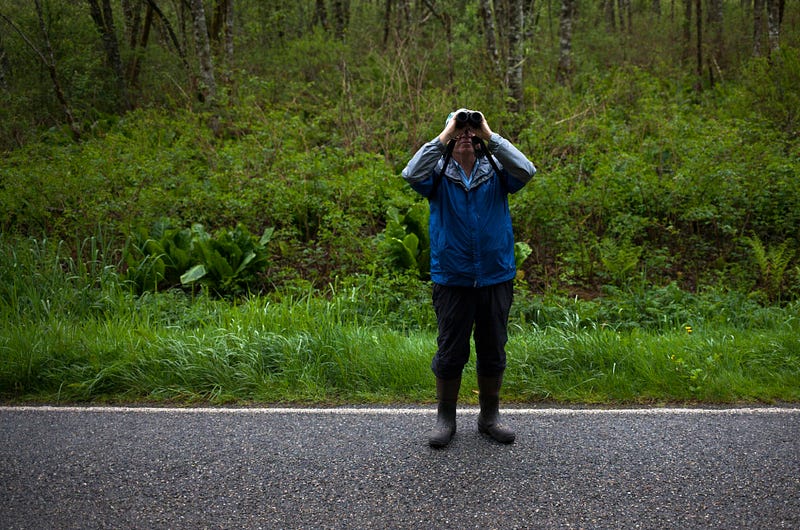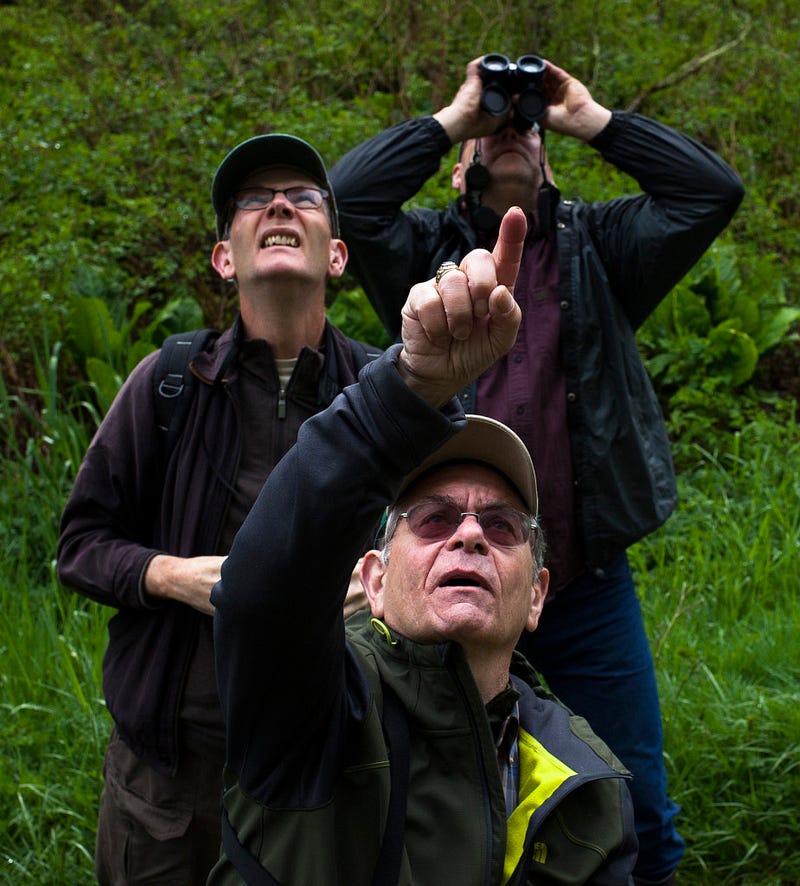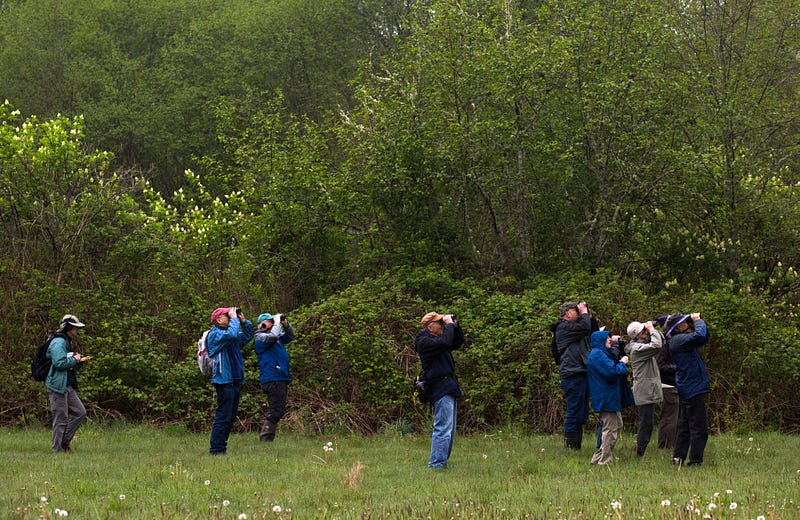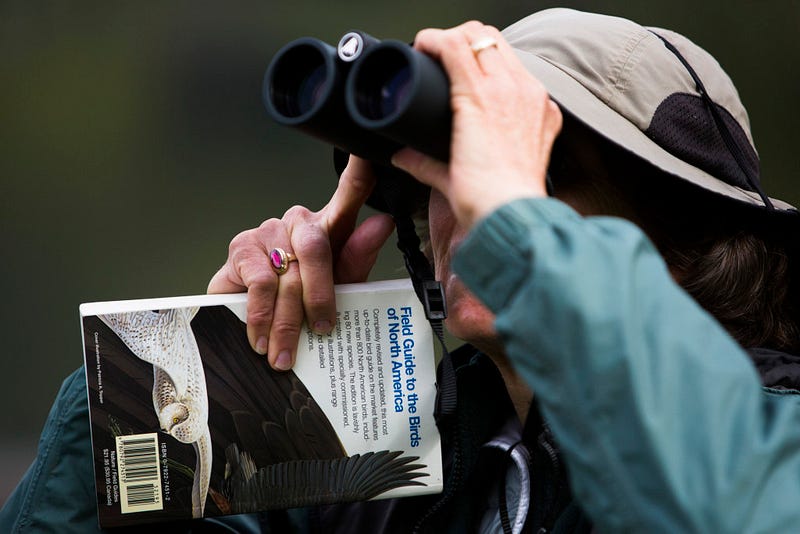Eyes on the Sky
Local chapter of the National Audubon Society strives to protect birds and their environments
STORY BY KATHERINE MISEL | PHOTOS BY DANNY MILLER
Several birds flit across the gray sky as rain trickles down. A dozen binoculars pan upward, tracking the animals in flight.The bird watching begins before the group leaves the parking lot, with all participants aware of the birds chirping as they congregate.The group then traipses through brush and thicket as they make their way to an open field framed by trees on three sides.
Steve Harper, the field trip organizer, collects the 12 participants and leads them further into a vast grassy space near Lake Whatcom in Bellingham.
“One of the reasons I’m bringing you out here is because it’s land trust property, so anyone can come out here anytime,” Harper says. “It’s a great birding spot.”
For members of the North Cascade Audubon Society, this is a typical day as bird watching enthusiasts.
North Cascade Audubon Society (NCAS) was established in 1970 and formed as a chapter of the National Audubon Society (NAS). At the time of NCAS’ creation, there was a national push on environmental politics within the chapters. NCAS has since come back to emphasize education about birds and their welfare as well as wildlife and bird habitat defense.

Paul Woodcock is the current vice president of the local chapter and has been an avid birder and outdoorsman since 1950
Birding was stereotyped as a nerdy or geeky hobby when he started decades ago, Woodcock says. By the time he joined NCAS in 1973, there had been a spike in popularity as younger generations become more environmentally aware.
Pam Borso, NCAS President, has been with the society since 2008 and became president in 2013.
“I love the programs,” Borso says. “I like that they are very welcoming, that they invite beginning birders to come and they sponsor field trips where people can take these skills out into the wild and practice.”

NCAS is currently composed of more than 150 paying members and invites all levels of birders to join activities to advance skills and learn about different birding and environmental topics.
“It is really in cooperation with National Audubon, who are trying to educate people as to what the possible ramifications of climate change are,” Woodcock says. “People who have been watching birds for years see the changes in their ranges.”
Such changes include hummingbirds beginning to live in Bellingham year-round. When Woodcock first came to the city, they were considered rare and were barely present in the 1950s and 60s, he says.
Woodcock describes this change as a shift north for the birds. It’s indicative of the fact that the climate is getting warmer, keeping birds in the area. Hummingbirds are being pushed to the brink of extinction because of this change, restricting their habitats so much that they may not have anywhere to go, he says.
Making people more aware of this information is a benefit to NAS, creatures and environment alike.
Birds may soon face earlier migration dates due to changing climate, Woodcock says. This prediction means resources they depend on during migration would be out of sync with the pattern and result in an endangered existence, he says.

NCAS is presently partnering with Whatcom Land Trust to count birds and collaboratively work toward protecting their habitat. They support the Whatcom Land Trust in finding money to purchase or to get conservation easements on private property so that it’s protected as wildlife habitat, Woodcock says. By monitoring birds and water quality in the land trust area, they can track the implications climate change may have on bird populations.
NCAS participants are enthusiastic about educating community members about bird populations and remain hopeful for the future of birds.
“[I’m passionate about] the possibility that we will have some places in nature where people will be able to go and enjoy nature just as it is” Borso says. “I really like the idea of preserving as much of what we have as we can, so that our kids and grandkids can get out there and see what these animals do in the wild and how they interact in their world to actually pique their curiosity and to get them to be lifelong learners.”
Back on the shores of Lake Whatcom, binoculars pan the surface looking for flapping wings and splashing water.
All is quiet except for the chirping birds and the crunch of gravel and sand under feet. The majority of the group turns away after awhile, heading back toward the path.
As they begin their journey back, one birder pushes their ears forward to get a better listen of the songbirds singing in the distance. Listening while bird watching is just as important, if not more, than observing the wildlife.

“You’re probably wondering why people go birding,” Harper says.
At first the group pauses, then they each give their own reason. Among the overlapping chatter, phrases such as “keeps people centered,” “treasure hunt,” “relaxing” and “increases awareness” hang in the air as the answers stop flowing.
“Listen,” one birder says suddenly.
Harper stops and glances up to the tress. He observes for a moment and then puts his binoculars to his eyes.
Harper takes them down again and asks a fellow birder, “Do you see it?”
The fellow birder replies, “No, but I hear it.”